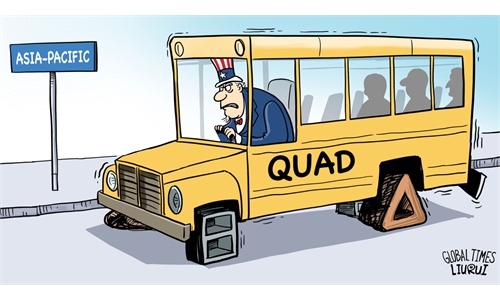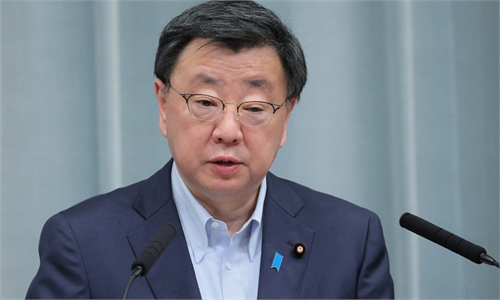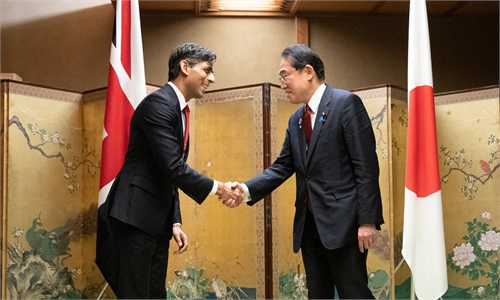Japan deepening defense co-op with India to 'offset uncertainties' brought by US policy: expert

India's Chief of Defence Staff Anil Chauhan, Army Chief Upendra Dwivedi, Defence Minister Rajnath Singh, Navy Chief Admiral Dinesh Kumar Tripathi and Air Chief Marshal Amar Preet Singh look on before the ceremonial reception of Japan's Defence Minister Gen Nakatani in New Delhi on May 5, 2025. Photo: AFP
The defense ministers of Japan and India agreed on Monday to deepen cooperation between their forces, including starting discussions toward establishing a senior officer-level dialogue body, Kyodo News reported. While analysis of several Japanese media outlets attempted to link the deeper defense ties reached between Japan and India to China factor, a Chinese expert pointed out that Japan is likely attempting to diversify its partnerships to offset uncertainties brought by US policies, and India is also unlikely to join a so-called "US-Japan camp" as India adheres to an "omnidirectional diplomacy."Japanese Defense Minister Gen Nakatani and his Indian counterpart Rajnath Singh met in New Delhi on Monday. Amid the rapidly changing and increasingly uncertain regional and international circumstances surrounding Japan and India, "it is increasingly important and necessary for the two" to further strengthen cooperation and coordination in the defense field, the Japanese Defense Ministry quoted Nakatani as saying.
The Japan Times called the remarks "a thinly veiled criticism of China." The Japanese media outlet also claimed China "increasingly flexing its military muscles in the region."
In reporting the meeting in New Delhi, Kyodo News asserted that "China continues to expand its military presence in the Indo-Pacific region."
"In recent years, strengthening defense cooperation with India has been a key diplomatic priority for Japan," said Qian Feng, director of the research department at the National Strategy Institute at Tsinghua University. However, their defense cooperation, when framed against the so-called "China's growing military presence," does not fit the broader trend of peace and stability in the region, Qian told the Global Times on Tuesday.
But Qian said that India values its relationship with China and prioritizes cooperation with Global South nations. Even if India and Japan grow closer, he argued, New Delhi is unlikely to join a so-called "US-Japan camp."
Uncertainty brought by US policy is also seen as a reason for closer Japan-India ties. Kyodo News reported that at the outset of the meeting, Nakatani said stronger ties between the two countries have become "more important" at a time when the US' commitment to the Indo-Pacific region remains unclear.
Qian noted that after the new US administration took office, it repeatedly pressed Japan to increase its share of defense spending while imposing additional tariffs, in a move that, from Tokyo's perspective, not only undermines its interests as a US ally but also exacerbates concerns over the unpredictability of Washington's foreign policy.
Under these circumstances, Japan is seeking to diversify its diplomatic and defense partnerships to hedge against uncertainties in US strategy, particularly those affecting the US-Japan alliance, Qian said. This approach aims to "buy insurance" for Japan while bolstering its leverage in negotiations with Washington, Quan believes.
Japan's Mainichi Shimbun observed that while Tokyo hopes to deepen cooperation through measures like defense equipment transfers, India adheres to an "omnidirectional diplomacy" that avoids alignment with any specific power, be it the US, China, or Russia, making smooth progress unlikely. Meanwhile, Japan must balance technological secrecy with collaboration, requiring "difficult maneuvering" in the years ahead.




